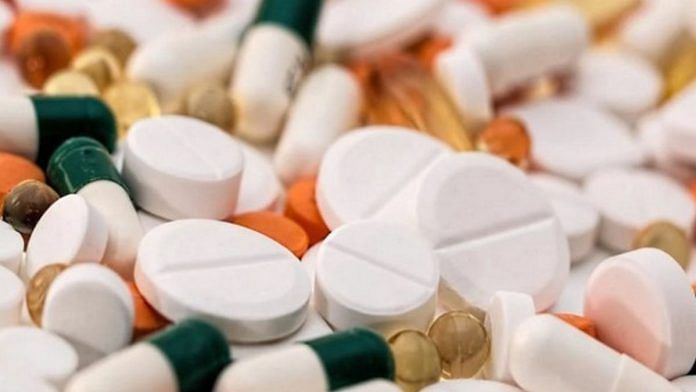New Delhi: The Indian Pharmacopoeia Commission (IPC) — the apex agency for setting drug standards in the country — last month issued a safety alert regarding nimesulide, a common painkiller and anti-fever medicine.
The alert warns that the drug can lead to “fixed drug eruption” — or skin rashes in specific parts of the body.
“Healthcare professionals, patients/consumers are advised to closely monitor the possibility of this adverse drug reaction with the use of this drug,” the alert said, adding that if such reactions are encountered, it should be reported to the commission’s pharmacovigilance programme. ThePrint has a copy of the alert.
Over the past few years, there has been concern around the safety of nimesulide — which belongs to a class of drugs called non-steroidal anti-inflammatory drugs (NSAIDs) — after the evidence started emerging that it is capable of causing liver damage, which may be fatal in some cases.
The drug, which was first launched in Italy in 1985, has never been approved for use in countries like the US, the UK, Canada, Australia, New Zealand and Japan, among others, over its safety profile concerns.
Additionally, in many countries, such as Finland, Spain, Ireland and Singapore, it was withdrawn from the market between 2002 and 2007. In India, too, the government decided to ban the paediatric formulations of the drug in 2011.
In India, the drug is available under several brand names, including Nimutab, Nimdase, Nimopen-MP Nise, Nimuwin, Nisulid, Nodard Plus, Nicip, Nimcap, Nic-P, Nic-Spas and Nimupain, among others.
The International Society of Drug Bulletins (ISDB) — an initiative supported by the World Health Organization to increase the sharing of high-quality information on medical treatments and medication between countries — in 2008 demanded that the drug be withdrawn worldwide.
“It offers no therapeutic advantage or better gastrointestinal safety compared with other NSAIDs, whereas it exposes patients to a higher risk of fatal hepatic disorders,” ISDB had said.
ISDB had also questioned why the European Medicines Agency, despite confirming the hepatic risks (risks to the liver) associated with nimesulide in 2007, merely limited the duration of treatment, leaving patients exposed to an unjustifiable fatal risk.
Meanwhile, a senior pharmacologist associated with Lady Hardinge Medical College in New Delhi, expressed surprise that the latest IPC alert on nimesulide indicated skin allergy but no hepatotoxicity (toxicity in the liver).
“There is strong evidence to that effect from other countries — I am surprised that the pharmacovigilance programme in India has not yet recognised that,” he said.
The pharmacologist pointed out that some doctors prescribe the medicine mainly because of its fast onset of action as it works by blocking the production of prostaglandins — a chemical associated with pain — thereby relieving pain and inflammation relatively quickly.
Also Read: More Indians getting hooked on opioid painkillers. Doctors warn of possible ‘pharma opioid epidemic’
‘Should be avoided’
Other experts ThePrint spoke to seconded the opinion of the pharmacologist, saying that nimesulide is known to cause liver dysfunction ranging from mild elevation of liver enzymes to acute liver failure, which can necessitate even emergency liver transplants.
In a few cases, the drug can even lead to the death of patients due to acute damage to the liver.
“It’s a second-line drug for both fever and pain, that is, we have many other relatively safer drugs. It’s preferable that we avoid using it,” said Dr Srividya S, consultant, internal medicine, with Manipal Hospital in Bengaluru.
Dr Vikas Mittal, a senior pulmonologist with C.K. Birla Hospital in Delhi, too, underlined that while the drug is commonly used to treat pain and inflammation associated with arthritis, its association with several severe side effects, particularly liver damage, should not be overlooked.
Other side effects of nimesulide, Mittal said, include upset stomachs and skin reactions.
“While nimesulide remains available for adults in Europe and India, there are ongoing discussions about a complete ban due to the potential for liver damage. Given the availability of safer NSAIDs with a lower risk of liver toxicity, it’s reasonable to consider withdrawing nimesulide from the market,” Mittal asserted.
With safer alternatives available, the potential benefits of nimesulide don’t outweigh the serious risks, the doctor stressed.
(Edited by Richa Mishra)
Also Read: Are 3 firms selling ibuprofen injectables at inflated MRP? Drug price regulator probes



